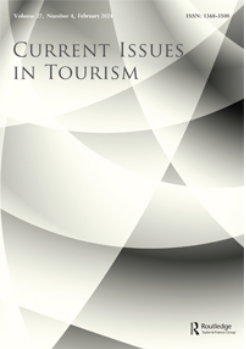生态旅游开发能否促进居民的环境关注:来自中国的准自然实验
IF 4.6
3区 管理学
Q1 HOSPITALITY, LEISURE, SPORT & TOURISM
引用次数: 0
摘要
摘要目的地居民环境关注是促进目的地可持续发展的关键力量。然而,在旅游经济学的框架内,关于生态旅游开发如何影响区域经济发展的实证证据很少。基于中国国家生态旅游示范区(CNEDA)划定的准自然实验,我们利用2011 - 2019年中国282个地级市的多源数据填补了这一空白。研究结果表明,CNEDA显著提高了目的地REC,并通过了稳健性检验,但这种影响是短期的。在依赖旅游业的城市,这种积极影响被放大。生态旅游开发对REC的影响存在结构性差异,有利于提升居民的生态价值和环境认知,而不是环境行为意愿。并提供了有关的政策影响。关键词:中国国家生态旅游示范区生态旅游环境关注准自然实验居民披露声明作者未报告潜在利益冲突。数据可用性声明数据集可根据合理要求从通讯作者处获得。本研究得到国家社会科学基金资助[批准号:21BJY194]。本文章由计算机程序翻译,如有差异,请以英文原文为准。
Can ecotourism development promote residents’ environmental concern: a quasi-natural experiment from China
ABSTRACTDestination residents’ environmental concern (REC) is a pivotal force in promoting sustainable destination development. However, empirical evidence on how ecotourism development affects REC is scarce within the framework of tourism economics. Based on a quasi-natural experiment of China’s National Ecotourism Demonstration Area (CNEDA) designation, we fill this gap using multi-source data of 282 Chinese prefecture-level cities from 2011 to 2019. The evidence indicates that CNEDA designation significantly promotes destination REC and passes the robustness tests, but this effect is short-term. The positive impact is amplified in tourism-dependent cities. The impact of ecotourism development on REC is structurally different, favouring promote residents’ ecological values and environmental cognitions over environmental behavioural intention. Relevant policy implications are also provided.KEYWORDS: China’s National Ecotourism Demonstration Areaecotourismenvironment concernquasi-natural experimentresident Disclosure statementNo potential conflict of interest was reported by the author(s).Data availability statementThe datasets are available from the corresponding author on reasonable request.Additional informationFundingThis work was supported by the National Social Science Foundation of China [grant number 21BJY194].
求助全文
通过发布文献求助,成功后即可免费获取论文全文。
去求助
来源期刊

Current Issues in Tourism
HOSPITALITY, LEISURE, SPORT & TOURISM-
CiteScore
15.50
自引率
10.00%
发文量
230
期刊介绍:
Journal metrics are valuable for readers and authors in selecting a publication venue. However, it's crucial to understand that relying on any single metric provides only a partial perspective on a journal's quality and impact. Recognizing the limitations of each metric is essential, and they should never be considered in isolation. Instead, metrics should complement qualitative reviews, serving as a supportive tool rather than a replacement. This approach ensures a more comprehensive evaluation of a journal's overall quality and significance, as exemplified in Current Issues in Tourism.
 求助内容:
求助内容: 应助结果提醒方式:
应助结果提醒方式:


